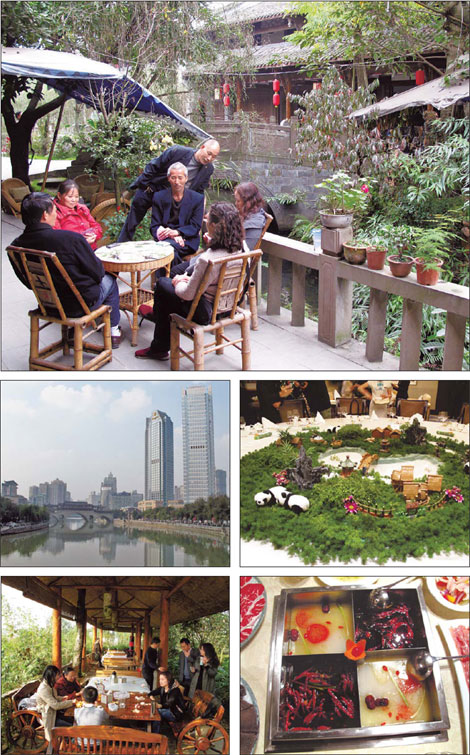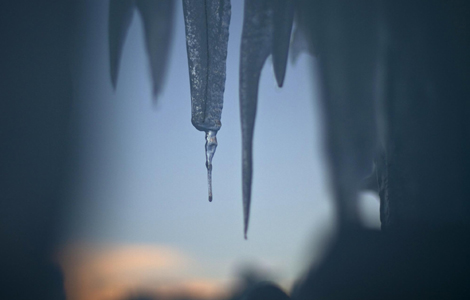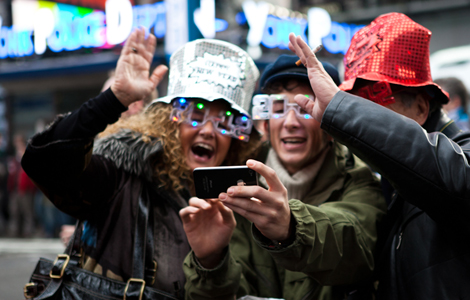Seriously fun
Updated: 2011-12-01 10:38
By Raymond Zhou (China Daily)
|
||||||||
 |
|
Clockwise from top: A card game in the mammoth Liu estate; a dinner table decorated with a miniature garden and pandas; a partitioned hotpot; a typical Sunday morning for a Chengdu family in the suburbs; a view of the Jinjiang River with the Shangri-La Hotel and Hejiang Pavilion. [Raymond Zhou / China Daily] |
A weekend getaway in Chengdu with Raymond Zhou reveals the usual enjoyments, plus a few surprises.
Chengdu used to bill itself as "a place you come to and do not want to leave".
For most people, this is more a temptation than a feasible choice.
It takes a special personality, which I sum up as "being serious about having fun", to make the capital city of Sichuan province your permanent residence.
However, a short trip to the land of spicy cuisines is at most a guilty pleasure.
No matter how busy your schedule, you've got to give yourself a break from time to time.
And do not use the excuse that you have access to authentic Sichuan gourmet elsewhere. It's not just about what you eat or how numbingly fiery the dish is.
It's something in the atmosphere, which I had the fortune to experience on a recent weekend and will recount with utmost honesty.
Saturday
6:30 am
I woke up before the alarm had its chance to rouse me.
Outside the large window, it was milky white.
"Is it a foggy day, or am I in the moon palace?" I thought.
As I lifted my body out of bed in a 33-floor room in the Shangri-La Hotel, the high-rises on the other side of the Jinjiang River loomed - dimly lit.
"It's just overcast - a usual day in Chengdu," I realized.
Hunger gnawed at me, but the Horizon Club Lounge might not be open.
As my eyes darted around in search of edibles, a figurine in the shape of two pandas chewing bamboo shoots jumped into my view. It's not an ornament, I figured, because it's placed next to the fruit basket.
It turned out to be chocolate, which tasted sweetest in this odd hour of stomach protestation.
I nibbled at the bamboo shoots first, and then bit off chunks of it. As I got closer to the cuddly animals, I hesitated.
"It's not right to gobble up a national treasure, is it?"
Flashback to Friday
The previous night, I was glued to a centerpiece on a dinner table in Shang Palace, a Level-2 restaurant that features Sichuanese and Cantonese cuisines.
Instead of a lazy Susan or a floral arrangement, the center of the table was a miniature garden with small bridges, pavilions, and, of course, giant pandas. Sure, it would be a misnomer to call them giant. Teeny-weeny would be more accurate, and lovely as expected.
"Chengdu is the hometown of the panda, you know," my host explained. "And the display is a reflection of the city's ecology, without the modernity, though."
You cannot escape the endlessly huggable but libido-deficient mascot.
A walk around the lobby would bring you face-to-face with renderings by avant-garde artists Guo Jin and Guo Wei of a panda on a tree and another in a Lady Gaga-like posture.
A dozen more paintings adorn the walls, saving me a trip to the artists' village or a gallery, or tempting one on further explorations of the city's vibrant art scene.
Back to Saturday
I was hesitating as I was driven to the western suburb.
I had visited poet Du Fu's thatched cottage on a previous trip, but I had never been to the Jinsha Museum, both of which are on the way.
The relics at Jinsha are supposed to shed light on a distant past, but I guess they confound more than illuminate.
Whatever was unearthed looks nothing like Chinese civilization as we know it. It could as well have been the site of long-forgotten hedonistic extraterrestrials.
10 am
I decided to head out of the city, about an hour from downtown, to Anren, one of many old towns dotting the landscape of Chengdu vicinity.
Three streets from the 1930s have been preserved and restored.
They are lined with 27 manors that used to house some of the biggest warlords of the region.
The half-Chinese, half-Western architecture bespeaks of an era when influences from home and abroad often clashed and then curiously coexisted in harmony.
Nowadays, most of the streetside properties have been converted to retail, where local delicacies and souvenirs are displayed in abundance.
Unique among them is a Book&Bed that provides accommodation, reading rooms and what it touts as "space to get in a trance".
The proprietor promises to periodically change the "pillow book" for each of its 10 guestrooms.
12 noon
There are plenty of eateries on the main streets, but I knew I had to veer off to a side street for a memorable dining experience.
Every restaurant was full, and I had to wait for a sidewalk table while trying my best to keep myself from drooling into the pot full of blood curd.
I'm not supposed to take spicy food - doctor's advice - but who can resist a diversion while in the epicenter of the intestine-shaking hotness.
And I didn't mind the garbage-collecting carts squeezing by on the narrow lane.
It was um fun.
Sichuan people may not be tall, but they can show a level of gutsiness beyond their average height, and it must have come from a heavy dose of such recipes.
2 pm
The Liu family used to dominate this place.
It gained nationwide notoriety when Liu Wencai became the target of mass denunciation in the 1970s. He was essentially epitomized as the evil property owner who pinched every farmer of the last grain harvested on his land.
Now we are told that was grossly exaggerated and he was actually quite nice to his hired hands and generous to charities. His 70,000-square-meter compound - with 20,000-square-meter structures - is now a museum.
I've read books about his fate and how his offspring suffered after the revolution.
Well, that shows wealth does not guarantee a good life. It is, rather, the spending of it that brings happiness - however temporary it may be. Sichuanese seem to have an inherent appreciation for the "seize-the-day" philosophy.
And it makes more sense after you've seen what the Lius went through.
5 pm
Back in Chengdu, Kuan Alley and Zhai Alley have no difference in width despite the names ("kuan" means wide, and "zhai" narrow).
The boutiques along the 400-meter-long passages attract a cross-section of the urban populace and - voila! - a French documentary crew.
9:30 pm
After a hotpot dinner in the alley district, I gave up the idea of bar hopping.
I've outgrown it - or, plainly put, am too old for it. I'd rather try out the CHI spa back at Shangri-La.
I had never imagined that putting heated pebbles on my body could be so relaxing - yet strangely not titillating.
The therapist knew exactly when it was too hot to leave the stones stagnant.
I wondered what else could be placed on your skin to create a sense of guiltless pleasure.
Maybe a stack of books or compact discs. Just kidding.
Sunday
9:30 am
After a breakfast at the hotel's Cafe Z, which features an around-the-world-in-80-bites theme both architecturally and gastronomically, it was time to lose the binge-induced kilos.
A Sunday morning bike ride through the new Jinjiang 198 Lohas greenbelt was a revelation.
The 6.7-km-long lane, which will be extended later, offers a world of its own, complete with a windmill and all the flora and sceneries a wetland can offer.
The modern world of a highway is only audible from behind the shrubbery - a faint reminder of how much urbanity has encroached upon us.
It's also a place for people watching. Whole families come out, with baby bicycles and grandparents.
Beijing families also frequent certain parks, but you can figure out the types of breadwinners.
But in Chengdu there is no trace of high finance or high tech on the faces or demeanors of the strollers or bikers.
They work to play, rather than use play as an interlude for work.
11:30 am
Also in the southeastern part of the city, about 10 minutes away from the bike park, is a cluster of villages with myriad households offering a dizzying array of enticing food and fun.
We picked Ying Garden of Three-Saint Village.
Lo and behold, there was Kieran Twomey, Shangri-La Chengdu's general manager, with his whole family in tow.
He enthused about the nearby area covered with peach blossoms in spring.
"You've got to come visit," he recommended.
I looked around. There was one family barbecuing and another playing ping-pong.
All the tables are placed outdoors, and nobody seems to dine inside the two-story house. All the rustic charms are so close to downtown and yet seem a world away.
It could have been the natural habitat for pandas for all I know.
2 pm
Before departure, I rambled around the 593-room hotel in which I had stayed two nights, which, according to its manager, "sits at the crossroads of the city's new and old".
Atop the bridge across the street is Hejiang Pavilion, a Tang Dynasty (618-907) structure mentioned in Marco Polo's travelogue.
I bet the Italian globetrotter of yore did not dare reveal what he felt about local pungency.
Behind Shangri-La is Lan Kwai Fong, a brand new mall of ultra-chic boutiques and bars named after the famous Hong Kong bar district, "populated by the ultra-chic of our city".
Across the river is one of Chengdu's older bar streets.
Most won't come alive until heaven draws a blanket of darkness over it.
It would be an understatement to call Chengdu fun-loving.
In a sense, people here incarnate the spirit of the cute creature that has launched its charm offensive in worldwide zoos and even Hollywood blockbusters.
That is, taking it a day at a time and enjoying whatever comes naturally.
Say, nature does not endow it with ample sunshine, and, hey, people here have delectable skin tones.
About the only thing not manifest in the panda is the craving for red-hot chili pepper.











